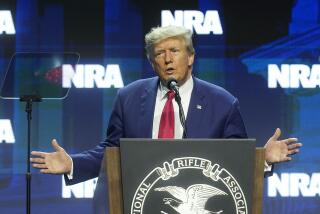Unrest in Egypt poses obstacle for Republicans
- Share via
Reporting from Washington — For weeks Republicans have tried to find some political traction against President Obama, but events keep getting in their way.
The latest obstacle has been the unrest in Egypt, which has further disrupted the GOP strategy over healthcare and the economy and forced conservatives to adapt their message to a fast-moving crisis that doesn’t break down cleanly along party lines.
Some Republicans — such as Senate Minority Leader Mitch McConnell (R-Ky.) and presidential aspirant Mitt Romney — have largely backed the White House’s take-it-slow approach. But others have sought to equate the instability in Egypt with the 1979 Islamic Revolution in Iran, and Obama with one-term former President Carter.
The current GOP message has been built almost entirely around opposition to the healthcare overhaul reform law and government spending. But since the bipartisan accomplishments of the lame-duck Congress at the end of last year, that message has repeatedly been drowned out.
Just as Republicans took hold of the House, the Tucson shootings forced them into a partisan truce, followed by Obama’s well-received State of the Union address. Then Egypt erupted, encouraging congressional Republicans to abide by the long-standing Washington principle that politics stops at the water’s edge.
“My view is America ought to speak with one voice,” McConnell said this week. “We have one president, one secretary of State. They ought to speak for America with regard to the crisis in the Middle East.”
Even Sen. Jim DeMint of South Carolina, who often forgos the GOP line, said, “We all need to be together on this and not use it for politics.”
But Jon Kyl of Arizona, the Senate’s No. 2 Republican, charged that Obama had not done enough to promote democracy in the Middle East, while Kentucky’s Rand Paul, a “tea party” favorite elected to the Senate in November, provoked Democrats and Republicans alike by calling for an end to all foreign aid, including to Egypt and Israel alike.
Likely 2012 presidential hopefuls Newt Gingrich, the former House speaker, former Arkansas Gov. Mike Huckabee and ex-Minnesota Gov. Tim Pawlenty all cautioned that President Hosni Mubarak’s departure could clear the way for the Muslim Brotherhood, an Egyptian Islamist political movement, to take some measure of power in the new government. Gingrich said that if that happens, Egypt “could go the way of Iran.”
Among conservative media figures, Fox News’ Glenn Beck, has warned of a fundamentalist Islamic takeover of the Middle East, while Rush Limbaugh told his radio listeners: “What happened in the first term of Jimmy Carter? We lost Iran to a bunch of radical Islamist extremists. Are we looking at the second term of Jimmy Carter here?”
But any role the Muslim Brotherhood would take in Egypt is unclear.
“The worries are legitimate,” said Leslie Gelb, president emeritus of the Council of Foreign Relations, who added that if the group was to take some measure of power in the new government, “the role Egypt plays in counter-terrorism would be impossible to continue.”
But Gelb said the dire warnings of Gingrich and others are probably overblown. “To say we’re talking about another clerical revolution like in Iran — we haven’t got the proof of that.”
Reza Aslan, a professor of Islamic Studies at UC Riverside called the conservative rhetoric “bald politicking.”
“This is a movement that has used fear of Islam to gin up support for themselves,” Aslan said. “They’re using these kinds of ideas for political gain, make no mistake about it. It’s actually good politics on their part to do this.”
Aslan said there is very little the Obama administration can do to prevent the Muslim Brotherhood from taking a political role in the future. “It’s like saying Obama’s fault the sun comes out tomorrow,” he said.
John Geer, a political science professor at Vanderbilt, said the Egyptian crisis showed the lack of foreign policy credentials in the potential Republican field, and cited that as one reason why speculation has grown that the U.S. ambassador to China, former Utah Gov. Jon Huntsman, may jump into the race.
Geer said that the wiser Republicans are the ones who have stayed silent or supported the president. “Americans like to back the president in a national security crisis,” he said.
Lisa Mascaro and Michael A. Memoli of the Washington bureau contributed to this report.
More to Read
Get the L.A. Times Politics newsletter
Deeply reported insights into legislation, politics and policy from Sacramento, Washington and beyond. In your inbox twice per week.
You may occasionally receive promotional content from the Los Angeles Times.










